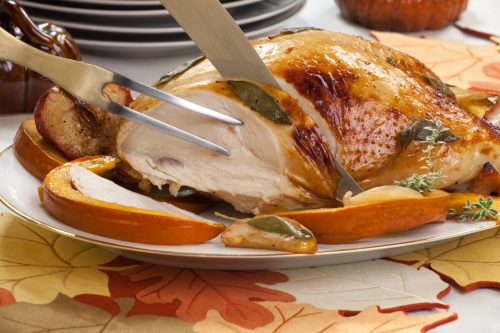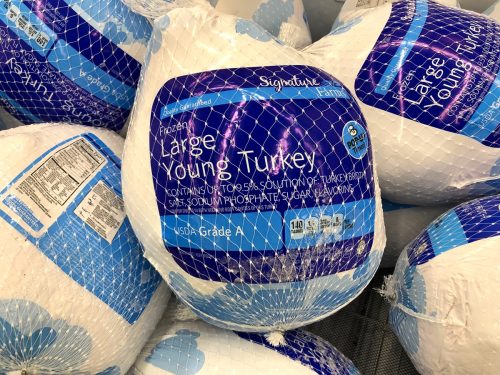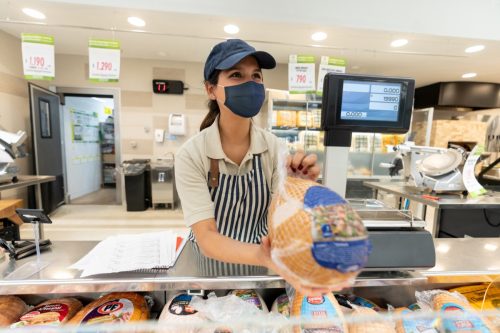This Seasonal Staple Is Disappearing From Grocery Stores, Experts Warn

As of this week, it’s officially fall, which means it’s time to put away our shorts in favor of sweaters and turn off our air conditioners and take out our space heaters. It’s also the end of summer peaches and plums, and time for pumpkin-everything season. Generally in the fall, we trade in light, summer foods for warmer, heartier options as the weather grows colder. Unfortunately, one seasonal staple is going to be harder to find at the grocery store this year. Read on to find out what item may not make it to your kitchen this fall.
RELATED: The Latest Major Shortage Is Happening at the Worst Time Possible.
Read the original article on Best Life.
Turkey is disappearing from grocery stores.

If you’re planning a turkey feast for Thanksgiving, you may be in trouble. Shady Brook Farms, one of the nation’s largest turkey suppliers, warned distributors and retailers in a late July letter that there’s bad news about the “status of fresh, whole turkeys for Thanksgiving and Christmas” this year, as reported by The New York Post. “The industry continues to struggle with production issues,” the letter stated.
According to experts, an increase in corn prices this year, which is turkeys’ main food source, resulted in many farmers reducing their supply of turkeys. “The biggest cost of growing a turkey is feeding it. And I think the cost of corn discouraged the big companies from hatching turkeys,” David Jaindl, owner of Jaindl Farms, a turkey production company in Allentown, Pennsylvania, told The Post.
RELATED: This Household Essential Is Disappearing From Grocery Store Shelves.
It may be even harder to find certain types of turkey this holiday season.

Phil Lempert, a food trends analyst and editor of Supermarket Guru, told Today that smaller turkeys will likely be especially hard to find in stores this fall. “When it comes to our favorite Thanksgiving food, smaller fresh and frozen turkeys (those 16 pounds and under) will be in short supply, so clean out your freezer now and do your holiday food shopping early, either in-store and online,” Lempert said.
Fresh turkeys in general are also going to be hard to come by, David Anderson, a professor of agriculture economics at Texas A&M University, explained to The New York Post. Anderson said that’s because “fresh turkeys have a tighter schedule. The eggs have to hatch at a certain time.”
RELATED: And for more food news sent right to your inbox, sign up for our daily newsletter.
Supermarkets say they’re already not getting the necessary supply.

Stew Leonard, owner of the supermarket company of the same name, told The New York Post that he was informed by Shady Brooks that they could only provide “50 percent of the turkeys we need and want for the holidays.” Meanwhile, Morton Williams grocery chain said they were not receiving any turkeys under 16 pounds this year.
“You can get whatever you want if it’s a 20-pound turkey,” Victor Colello, Morton Williams’ meat buyer, told The Post. “I’m frustrated that we won’t get the most popular size bird. It’s just another hurdle we have to jump over. I’ll probably have to break down some of the larger turkeys, to give people the parts they want.”
Many holiday foods may also be more expensive this year.

“Holiday food shopping this year will be more challenging than ever,” Lempert told Today, noting that there is a high possibility of price increases for many animal-based staples like milk, eggs, beef, pork, chicken, and turkey.
“The perfect storm of climate change, especially the wildfires in the West, has destroyed some crops, which has driven up the cost of soy and corn feeds for animals, which translated to increased costs for the farmer and therefore the shopper,” Lempert explained.
He said that it is likely prices of these products will continue to rise even after the holidays, throughout the next 16 to 18 months.
RELATED: If You Live Here, Bacon Is About to “Disappear,” Experts Warn.